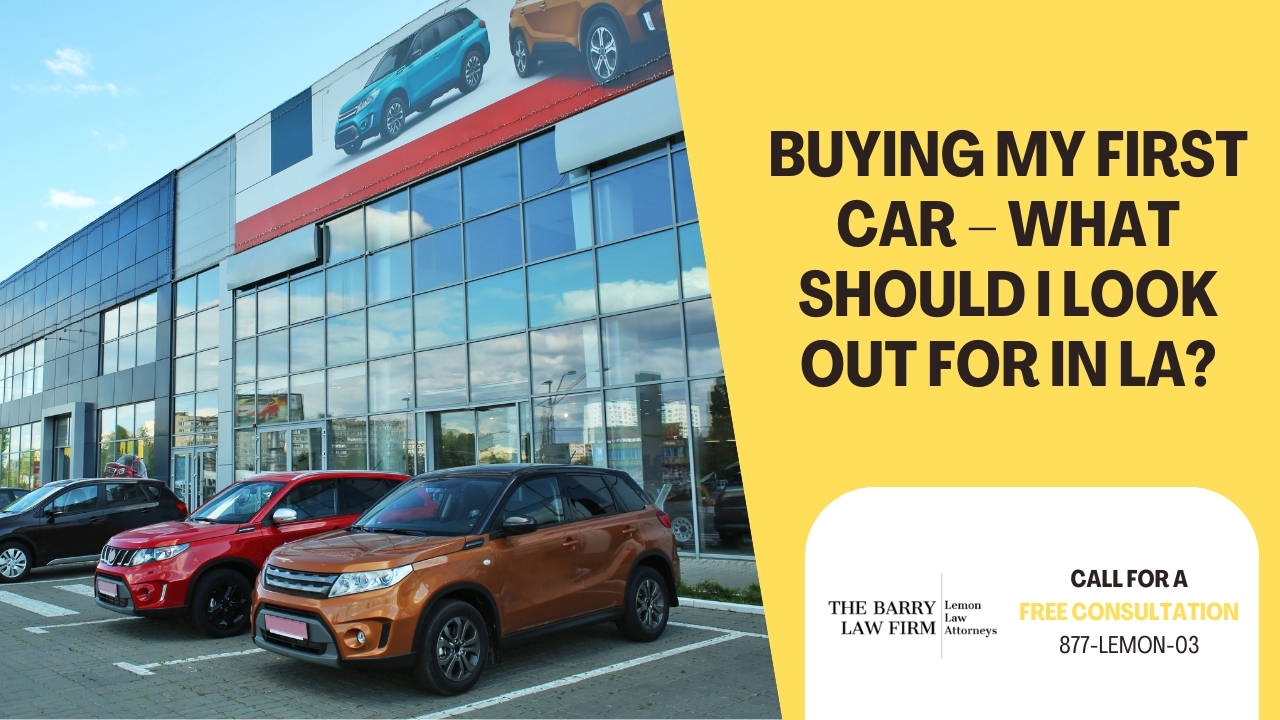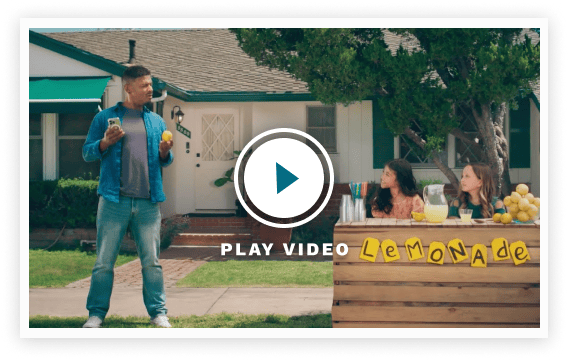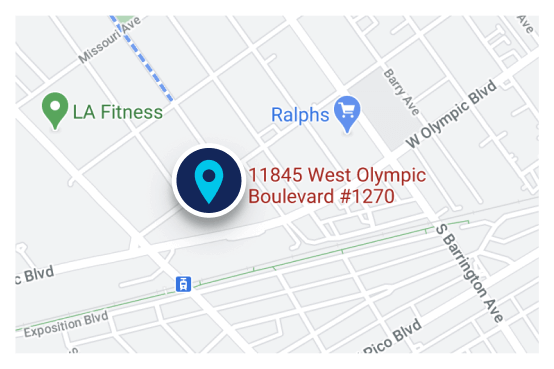
Los Angeles is a car owners’ city. Outside of Central Los Angeles, which is more walkable and has better public transportation, owning a reliable car to get around in LA is essential.
If you are considering your first new car purchase in Los Angeles, you should focus on affordability, safety, and reliability. Determining a new car’s reliability is key. Numerous regulations ensure that cars made in the U.S. are generally safe, and you’ll be able to figure out what you can afford. But new cars roll off the assembly line every day with manufacturing and design flaws that make them unreliable.
You want to avoid a car known as a “lemon” for your first purchase of a new car. A lemon is a vehicle with significant problems impacting its usability, value, or safety covered by the manufacturer’s original warranty that cannot be repaired.
But even if you do purchase a lemon, The Barry Law Firm in Los Angeles can help you demand that the manufacturer buy it back from you, as California’s Lemon Law allows. It is a complex process that car manufacturers are ready to fight, though. At The Barry Law Firm, our Lemon Law attorneys have helped thousands of car buyers and lessees from LA and across California pursue successful Lemon Law claims.
If you plan to buy a car in LA, take your time, do your research, and choose a vehicle that will serve you for several years to come. And if you happen to buy a lemon, contact The Barry Law Firm for a FAST & FREE consultation about seeking a refund through a Lemon Law claim.
How to Avoid Buying a Lemon
Chances are that you will do fine in your first new car purchase. Most American and foreign-made new cars are generally solid vehicles. But some do have flaws, and some cars are lemons. It happens, but you can steer clear of known problems in a new car with a little bit of effort.
Do Your Research
Once you have decided what you want in a new car and what you can afford, you should learn about several models that fit your needs. See what experts from online resources say about vehicles you are interested in, such as:
These sources provide valuable information, such as vehicle specifications, prices, reviews, and ratings.
If you have family, friends, or colleagues who drive cars you might like to own, ask them about their experience with them.
Once you have narrowed your choices, look into vehicle histories. For instance, you can check for a vehicle’s recalls, investigations, and complaints with the National Highway Traffic Safety Administration (NHTSA). While recalls don’t necessarily make a vehicle a lemon, a car with several recalls may be more likely to be defective.
Test Drive and Inspect Your Future Car
Of course, you’ll want to test drive a new car before you buy it to see how it handles and works. Check for the following:
- Look for a comfortable ride with good visibility (i.e., check out the vehicle’s blind spots).
- Check out how the vehicle accelerates, brakes, and steers. Try to drive it in a few different road conditions so you can get a feel for it at higher and lower speeds. See how it handles curves, turns, and hills.
- Check the vehicle’s various controls and technology to see whether they are user-friendly.
- Listen for excessive road noise or any unusual noises, such as squeaks or rattles.
- Consider whether the cabin offers the space you’ll need for passengers and cargo. See how easy it is to get in and out of the vehicle.
You may also want to have a mechanic or other professional inspect the vehicle to ensure everything looks in order.
What You Need to Know About Warranties
When you buy a new car in California, it should come with a manufacturer’s express warranty that gives you rights if the vehicle does not perform as promised. It promises repair or replacement of certain vehicle systems and parts without charge. The warranty will last for either a set amount of time or number of miles driven.
Manufacturers’ warranties typically don’t cover items that wear out over time, like tires, brake pads, or spark plugs, or to glass. They also do not cover damage caused by accidents, improper use of the vehicle, or lack of maintenance.
Your new car salesman or a sales manager will quickly go over your new car’s warranty with you. You should ask questions and review the warranty document on your own to determine what components are covered, what exclusions the warranty specifies, and how long it lasts. That original manufacturer’s warranty will be what protects you if you do end up purchasing a lemon.
You may also be offered an “extended warranty.” Extended warranties — also known as “service contracts” — are optional products available for an additional fee. They extend the coverage on a new car beyond what the manufacturer’s warranty provides. Plans vary in length of coverage, what they cover, and price. An extended warranty may reduce the financial stress of owning and keeping up a new car. However, they do not apply to the protections California’s Lemon Law offers.
What to Do After the Purchase of a New Car
You have carefully selected the best car for you and made the purchase. But your due diligence as a responsible car owner doesn’t end there. Even if it seems like you have bought the most reliable car on the market, any vehicle could potentially be a lemon. There are critical steps you can take to protect yourself just in case your new car ends up being defective.
Save All Your Documentation
There’s a lot of paperwork with a new car purchase. It may be provided to you in a folder or an envelope along with your vehicle’s owner’s manual. Save anything related to the purchase of your new car, including the:
- Purchase agreement
- Vehicle warranty
- Financing documents
- Vehicle registration
This documentation can all be vital in a future Lemon Law claim.
You should also review the maintenance recommendations in your new car’s owner’s manual and follow them. If you keep up on the suggested maintenance, the manufacturer will have a hard time claiming your vehicle’s issues are due to neglect.
Watch for Any Problems
Any warranty-covered defect that substantially impacts your vehicle’s use, safety, or value could potentially make it a lemon. However, there are a few common Lemon Law defects to keep an eye out for:
- Engine and transmission issues
- Electrical system malfunctions
- Braking and suspension issues
- Air conditioning and heating system failure
- Extensive paint and body defects
See an Authorized Dealership for Repairs
As problems arise with a new car — stalling, electrical problems, brake failure, etc. — you should promptly take it to a dealership or service center that is authorized by your vehicle’s manufacturer for repairs.
A car’s warranty cannot be automatically voided simply because repairs or maintenance were not performed by the dealership. But if the dealership or manufacturer can argue that “non-dealership” repairs or modifications have caused an issue, they may say the warranty no longer covers that specific issue.
Another critical reason for going to an authorized repair center is to protect yourself for any future Lemon Law claim you may need to file. The manufacturer is entitled to a reasonable number of attempts to fix the issue before a car can be considered a lemon. Those attempts must be made by the manufacturer, typically through the authorized dealership.
By taking your vehicle to the right place as soon as issues come up, you can protect your ability to file a Lemon Law if needed. You should also save all repair orders and invoices, especially if you keep having to take your car in to fix the same issue.
Know Your Lemon Law Rights
In some cases, the manufacturer cannot repair a significant problem covered by their warranty. Under California law, a vehicle is a lemon if a defect covered by the manufacturer’s original warranty that significantly impairs the vehicle’s use, value, or safety is unrepairable after the manufacturer has been allowed a reasonable number of repair attempts. The owner of a lemon may demand that the manufacturer buy it back from them and refund their costs and losses associated with owning or leasing a faulty vehicle.
If You Think You Purchased a Lemon, Contact a Lemon Law Attorney
You can do everything by the book when you buy a car in LA and still wind up with a lemon. If you have a new car under warranty that you think is a lemon, The Bary Law Firm can help you. We’ll review your case for free and help you pursue a Lemon Law claim at no charge if you are eligible. Your vehicle’s manufacturer is required to pay your legal fees after a successful claim, and you’ll never see a bill from us – no matter the outcome of your case!
Contact The Barry Law Firm in Los Angeles today for experienced help with a California Lemon Law claim.




